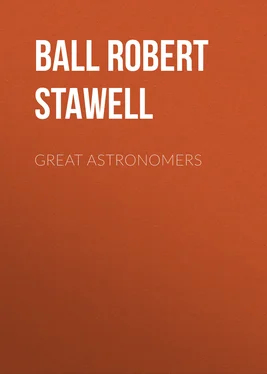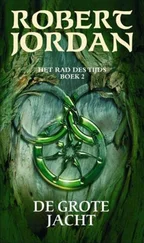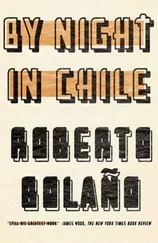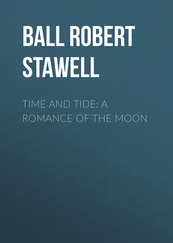Robert Ball - Great Astronomers
Здесь есть возможность читать онлайн «Robert Ball - Great Astronomers» — ознакомительный отрывок электронной книги совершенно бесплатно, а после прочтения отрывка купить полную версию. В некоторых случаях можно слушать аудио, скачать через торрент в формате fb2 и присутствует краткое содержание. Жанр: Биографии и Мемуары, Физика, foreign_edu, на английском языке. Описание произведения, (предисловие) а так же отзывы посетителей доступны на портале библиотеки ЛибКат.
- Название:Great Astronomers
- Автор:
- Жанр:
- Год:неизвестен
- ISBN:нет данных
- Рейтинг книги:4 / 5. Голосов: 1
-
Избранное:Добавить в избранное
- Отзывы:
-
Ваша оценка:
- 80
- 1
- 2
- 3
- 4
- 5
Great Astronomers: краткое содержание, описание и аннотация
Предлагаем к чтению аннотацию, описание, краткое содержание или предисловие (зависит от того, что написал сам автор книги «Great Astronomers»). Если вы не нашли необходимую информацию о книге — напишите в комментариях, мы постараемся отыскать её.
Great Astronomers — читать онлайн ознакомительный отрывок
Ниже представлен текст книги, разбитый по страницам. Система сохранения места последней прочитанной страницы, позволяет с удобством читать онлайн бесплатно книгу «Great Astronomers», без необходимости каждый раз заново искать на чём Вы остановились. Поставьте закладку, и сможете в любой момент перейти на страницу, на которой закончили чтение.
Интервал:
Закладка:
It appears that Otto, the father of Tycho, had a brother named George, who was childless. George, however, desired to adopt a boy on whom he could lavish his affection and to whom he could bequeath his wealth. A somewhat singular arrangement was accordingly entered into by the brothers at the time when Otto was married. It was agreed that the first son who might be born to Otto should be forthwith handed over by the parents to George to be reared and adopted by him. In due time little Tycho appeared, and was immediately claimed by George in pursuance of the compact. But it was not unnatural that the parental instinct, which had been dormant when the agreement was made, should here interpose. Tycho's father and mother receded from the bargain, and refused to part with their son. George thought he was badly treated. However, he took no violent steps until a year later, when a brother was born to Tycho. The uncle then felt no scruple in asserting what he believed to be his rights by the simple process of stealing the first-born nephew, which the original bargain had promised him. After a little time it would seem that the parents acquiesced in the loss, and thus it was in Uncle George's home that the future astronomer passed his childhood.
When we read that Tycho was no more than thirteen years old at the time he entered the University of Copenhagen, it might be at first supposed that even in his boyish years he must have exhibited some of those remarkable talents with which he was afterwards to astonish the world. Such an inference should not, however, be drawn. The fact is that in those days it was customary for students to enter the universities at a much earlier age than is now the case. Not, indeed, that the boys of thirteen knew more then than the boys of thirteen know now. But the education imparted in the universities at that time was of a much more rudimentary kind than that which we understand by university education at present. In illustration of this Dr. Dreyer tells us how, in the University of Wittenberg, one of the professors, in his opening address, was accustomed to point out that even the processes of multiplication and division in arithmetic might be learned by any student who possessed the necessary diligence.
It was the wish and the intention of his uncle that Tycho's education should be specially directed to those branches of rhetoric and philosophy which were then supposed to be a necessary preparation for the career of a statesman. Tycho, however, speedily made it plain to his teachers that though he was an ardent student, yet the things which interested him were the movements of the heavenly bodies and not the subtleties of metaphysics.
TYCHO BRAHE.
On the 21st October, 1560, an eclipse of the sun occurred, which was partially visible at Copenhagen. Tycho, boy though he was, took the utmost interest in this event. His ardour and astonishment in connection with the circumstance were chiefly excited by the fact that the time of the occurrence of the phenomenon could be predicted with so much accuracy. Urged by his desire to understand the matter thoroughly, Tycho sought to procure some book which might explain what he so greatly wanted to know. In those days books of any kind were but few and scarce, and scientific books were especially unattainable. It so happened, however, that a Latin version of Ptolemy's astronomical works had appeared a few years before the eclipse took place, and Tycho managed to buy a copy of this book, which was then the chief authority on celestial matters. Young as the boy astronomer was, he studied hard, although perhaps not always successfully, to understand Ptolemy, and to this day his copy of the great work, copiously annotated and marked by the schoolboy hand, is preserved as one of the chief treasures in the library of the University at Prague.
After Tycho had studied for about three years at the University of Copenhagen, his uncle thought it would be better to send him, as was usual in those days, to complete his education by a course of study in some foreign university. The uncle cherished the hope that in this way the attention of the young astronomer might be withdrawn from the study of the stars and directed in what appeared to him a more useful way. Indeed, to the wise heads of those days, the pursuit of natural science seemed so much waste of good time which might otherwise be devoted to logic or rhetoric or some other branch of study more in vogue at that time. To assist in this attempt to wean Tycho from his scientific tastes, his uncle chose as a tutor to accompany him an intelligent and upright young man named Vedel, who was four years senior to his pupil, and accordingly, in 1562, we find the pair taking up their abode at the University of Leipzig.
The tutor, however, soon found that he had undertaken a most hopeless task. He could not succeed in imbuing Tycho with the slightest taste for the study of the law or the other branches of knowledge which were then thought so desirable. The stars, and nothing but the stars, engrossed the attention of his pupil. We are told that all the money he could obtain was spent secretly in buying astronomical books and instruments. He learned the name of the stars from a little globe, which he kept hidden from Vedel, and only ventured to use during the latter's absence. No little friction was at first caused by all this, but in after years a fast and enduring friendship grew up between Tycho and his tutor, each of whom learned to respect and to love the other.
Before Tycho was seventeen he had commenced the difficult task of calculating the movements of the planets and the places which they occupied on the sky from time to time. He was not a little surprised to find that the actual positions of the planets differed very widely from those which were assigned to them by calculations from the best existing works of astronomers. With the insight of genius he saw that the only true method of investigating the movements of the heavenly bodies would be to carry on a protracted series of measurements of their places. This, which now seems to us so obvious, was then entirely new doctrine. Tycho at once commenced regular observations in such fashion as he could. His first instrument was, indeed, a very primitive one, consisting of a simple pair of compasses, which he used in this way. He placed his eye at the hinge, and then opened the legs of the compass so that one leg pointed to one star and the other leg to the other star. The compass was then brought down to a divided circle, by which means the number of degrees in the apparent angular distance of the two stars was determined.
His next advance in instrumental equipment was to provide himself with the contrivance known as the "cross-staff," which he used to observe the stars whenever opportunity offered. It must, of course, be remembered that in those days there were no telescopes. In the absence of optical aid, such as lenses afford the modern observers, astronomers had to rely on mechanical appliances alone to measure the places of the stars. Of such appliances, perhaps the most ingenious was one known before Tycho's time, which we have represented in the adjoining figure.
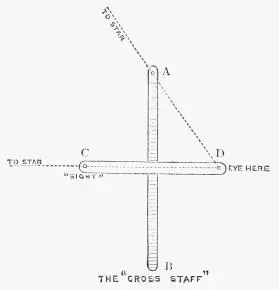
Let us suppose that it be desired to measure the angle between two stars, then if the angle be not too large it can be determined in the following manner. Let the rod AB be divided into inches and parts of an inch, and let another rod, CD, slide up and down along AB in such a way that the two always remain perpendicular to each other. "Sights," like those on a rifle, are placed at A and C, and there is a pin at D. It will easily be seen that, by sliding the movable bar along the fixed one, it must always be possible when the stars are not too far apart to bring the sights into such positions that one star can be seen along DC and the other along DA. This having been accomplished, the length from A to the cross-bar is read off on the scale, and then, by means of a table previously prepared, the value of the required angular distance is obtained. If the angle between the two stars were greater than it would be possible to measure in the way already described, then there was a provision by which the pin at D might be moved along CD into some other position, so as to bring the angular distance of the stars within the range of the instrument.
Читать дальшеИнтервал:
Закладка:
Похожие книги на «Great Astronomers»
Представляем Вашему вниманию похожие книги на «Great Astronomers» списком для выбора. Мы отобрали схожую по названию и смыслу литературу в надежде предоставить читателям больше вариантов отыскать новые, интересные, ещё непрочитанные произведения.
Обсуждение, отзывы о книге «Great Astronomers» и просто собственные мнения читателей. Оставьте ваши комментарии, напишите, что Вы думаете о произведении, его смысле или главных героях. Укажите что конкретно понравилось, а что нет, и почему Вы так считаете.
